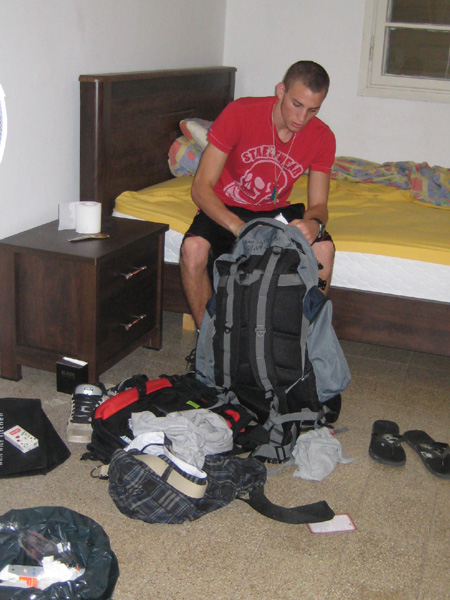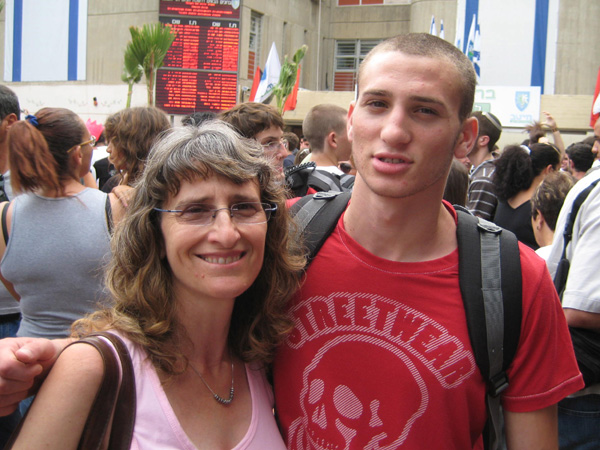I started this letter (which by the time of its completion is no longer a "letter") Tuesday morning, August 3, around 11:00 - after Tzippi and I had returned from seeing Eitan off to the army. I had a number of semi-pressing work-related tasks to attend to which, perhaps thankfully, kept me from writing more than an opening paragraph at that time. The truth is, however, that I was well aware that my chances of "finishing" this were close to nil - too many thoughts were rushing through my head to actually make sense out of them. I suppose that one of those thoughts was that I really should "make sense" out of this event, even though I knew that doing so was impossible, and perhaps not even desirable. The best I could hope for was narrative, or at least a narrative that could serve as the backbone for the myriad of thoughts and emotions that were engulfing me. Sending a son off to the army is, understandably, an ongoing narrative with elements that will only reveal themselves over time - elements that even if I can glimpse them are still unclear and unpredictable. But in this particular case when I sat down to write Tuesday morning, even that first report, what I suppose is a first chapter, was far from complete. To a very real extent that unfinished quality prevented me from writing - I was too emotionally involved in the enfolding drama to approach the larger picture, or even to have the strength to report it. Now, just over 48 hours later, when at least this first chapter (or perhaps the preface) is "complete" I feel as though I can sit and write.
At about 7:15 on Tuesday morning Tzippi and I got into the car and drove the perhaps 200 meters to Eitan's room (it's hardly an apartment) to pick him up and drive with him to the army induction center through which all enlistees (and dischargees) pass. The base is located in the greater Tel Aviv area, and since we were unsure whether we'd hit traffic at that time of day, we left earlier than we had to. Traffic was relatively light, and even with one slightly wrong turn and searching for parking, we were more than on time. Though I don't really remember, I assume that this was the third time I'd been to this base - once 36 years ago when I enlisted, and then one year later when I was discharged. It's a fair guess that at one point or another in their lives every Jewish Israeli visits this base.

final packing before leaving home
I'm not sure how best to describe the scene we encountered upon entering the square where the future inductees waited for their names to show up on a large electronic marquee on one of the buildings that bordered the square.
 one more photograph - with the electronic board in the background |
Eitan was accompanied by his parents, but it seemed that in most cases entire families were there to see their kids off, and in many of these friends and classmates were there as well - singing, drumming, dancing, and in general creating a strangely festive atmosphere. At one point as we made our way through this crowd I noticed a large quantity of candies, mostly squashed, on the ground. Apparently in a festive, bar-mitzvah like, fashion these had been thrown on the enlisting son. I have the impression that this atmosphere is encouraged by the army, perhaps in "collusion" with our media. About twice a year we'll see a television report from this base that describes the atmosphere. It seems to me that these reports are designed to convince us that the sort of behavior we encountered is normative. Of course army service is an integral part of Israeli society, but to my mind there's a world of difference between accepting it and celebrating it. I should perhaps note here that although the atmosphere was to my mind distressingly festive, I didn't get the impression that it was militaristic. Rather, this has inevitably become an Israeli rite of passage and has acquired an accepted, perhaps expected, set of behaviors.
 candies on the ground of the enlistment plaza |
I'm very sure that when Eitan was born I didn't say something along the lines of "when he'll be 18 perhaps he won't have to go into the army". It was clear then, and probably well before then as well, that he would. I should perhaps add that I viewed this then, as I do now, not only as inevitable, but also as necessary. I doubt that I have to present credentials to prove that I'm against wars and violence - though I could probably convincingly do so. But credentials of that sort don't change the fact that I believe that Israel has both the right, and the need, to defend itself. (This is not, I suppose it goes without saying, the best of all possible worlds.) I prefer to refer to our army as the IDF - the Israel Defense Forces, though sadly I'm critically aware of the fact that much too much of our "defense" is oppressive policing of the occupation.
So, army service is something we live with, something we grow up knowing is going to happen. Because of this it's also something for which we make plans. Months before his projected enlistment date Eitan filled out forms in which he noted his preferences; he took part in at least one day of trials for elite units (and was invited to continue the trials for at least one of these). For months before going in we assumed that he'd be going into an infantry unit as he had requested, and for which he most certainly was suitable. And then, a few weeks before his original enlistment date, the date was moved back a week and he was informed that he was going into artillery.
This is the right place for yet another aside: Does it matter what unit someone serves in? There are a number of different ways of asking this question. One of them, the way that parents probably most ask it, is "what's the safest way of getting through these three years?". Another, to my mind very legitimate, way of asking it is "how can I get the most out of this significant period of my life?". Obviously, these two don't necessarily coincide. And in our present (make that "present continuous") situation, still other questions should be raised. For instance, is it possible to serve in a defense capacity without being an occupier?
The most obvious answer to that last question is "no", but I suppose it demands yet another aside within this aside. I suppose that it's a truism that armies continue to exist because they can recruit 18 year old kids. If their base of potential soldiers was forty year olds I suppose they'd find very few recruits who thought that any of this actually makes sense. Eitan is not particularly political. Put somewhat differently, I really don't know what his political opinions are. He often hints that he thinks that his father's extreme leftist leanings are off the wall, but I think that most of this is posing. On the other hand, I'm sure that he feels that what he's doing is necessary - even to the extent to which political and ideological questions that agonize his father hardly concern him. And of course though they "concern" me, they don't have easy answers. During the first intifada I almost went to jail for refusing to serve in the territories, ultimately serving there (twice) for a wide variety of reasons. One of the central of these was that back then I hoped (and today still believe) that in the not too distant future Israel will withdraw from most of the still occupied territories, and that this withdrawal would be met by refusal to serve by many of those who oppose the withdrawal. I convinced myself that painful as playing by the rules might be for me, breaking them would legitimize that future refusal, and even jeopardize its taking place. I don't have a clear-cut cut-off point for where refusal stops being ill-advised and instead becomes necessary. I'm certainly not willing to say that it's always illegitimate. But it's clear to me that anyone who wants to be able to have a say in Israel's future has to be careful. Particularly when you're clearly outside of the consensus, it's important to maintain certain ground rules. One of the central of these is serving in the army, as I did, in a combat infantry unit, for one year of active service and twenty of reserve duty.
But again, at this stage in his life these considerations don't particularly disturb Eitan. He wants to do something interesting in the army, and "interesting" in this instance means combat. Infantry is combat, while artillery isn't front line. Perhaps after all of the earlier asides here it comes as a surprise to read that I understand and respect his preference. I'm even proud of it. Of course as his father this also makes me uncomfortable - what father knowingly encourages his son to encounter danger. But even with all the ambivalence that I've expressed here, I know that Israel has to defend itself. The final line of Irving Layton's "For My Two Sons, Max and David" has accompanied me for the past forty years, and even if it's impossible not to feel ambivalent toward it, it still rings true for me. What's more, though we often hear criticism of the degree to which the military and politics mix in this country, we are a country in which the poor or the disenfranchised aren't our cannon fodder - we are all in the military.
| Toward the end of World War II my father was sent overseas as an infantry soldier. He saw combat, I don't know how much, in the liberation of Munich. I recall a story he told a number of times, though over the years the details have blurred: At some point in combat, an American Indian member of his unit, a much better fighter than Dad, saw him cowering next to a wall. He said to Dad something like "you're Jewish aren't you?", to which Dad answered that he was. "Well", he responded, "those Nazi's are murdering your people - aren't you going to try and stop them?". With all my anti-war sentiments, I understand that question. |
So Eitan was upset that he was being diverted to a task that to his mind was less than what he wanted, and his parents, at least partially against their best interests, attempted to support him in this. We contacted people whom we thought might be able to help, or at least who might be able to direct us toward where we could get this decision changed. It was clear that the decision to put him in artillery wasn't because he wasn't fit for infantry - quite the opposite, we got the feeling that the army wanted to raise the level of its artillery core and thus directed some of its best prospects to that corps. But what's best for the army isn't necessarily best for my son, and we did what we could, unsuccessfully, to change the decision. After a few faxes in the last two weeks before his enlistment it became clear that our options were very limited. Pretty much the only option still open was one that we approached with a great deal of trepidation - we'd been told that sometimes if someone refuses to serve in the unit he's slated for, he will be punished with a couple of weeks of semi-military-prison and then, when his case is reconsidered, given what he wants. Eitan decided that this was worth a try.
What parent in his or her right mind would encourage his or her son to spend time in a sort of prison in order for him to get into a more dangerous unit than the one into which he's about to be inducted? I agree - it doesn't make sense. But then again, lots of aspects of life in Israel don't make sense. (Tzippi reports that this week she heard a fascinating item on the news - Israel ranks eighth in the world for satisfaction of our place of living. Figure that one out!) I'm not sure it's accurate to say that we "encouraged" Eitan, but we definitely respected his determination, and his decision.
What this meant, however, was that in addition to the already stressful situation of sending a son off to the army, we also had the added baggage of not knowing where he was going to end up, or whether he'd be punished for his desire to hold out for what he wanted. So, when Eitan's name showed up on the electronic board, and he approached the bus that would take him into the induction center, we not only wished him well and contained our tears in order to tell him that we were proud of him - we also truly didn't know where he would end up that evening.
 past the gate, and onto the bus |
Throughout the day and the evening we heard nothing – until a bit after 22:30 at night when he phoned. As we’d expected, he refused to go to artillery, and instead he was in a sort of limbo – he’d met with a placement officer who was apparently quite appreciative of his desire to serve, but not at all encouraging about fulfilling it. And worse, though he wasn’t in prison, his refusal put him with a group of similar kids who were under the “command” of other kids who enjoyed applying psychological pressure, including telling them that if they didn’t agree to what they’d been offered they’d totally lose their change of being in any sort of combat unit. Eitan went to sleep that night very discouraged.
 somewhat to my surprise, Eitan asked that we take this photograph, a moment before boarding the bus we're both smiling ... but perhaps one can see that I'm also tearing |
The next morning I contacted our kibbutz secretary – a “youth” of about forty who’s also a relatively high ranking officer. I reported what I knew about Eitan’s situation, including the history of what we’d tried to do to get him into a more desirable (to him) unit. He was very receptive and promised to see what he could do, though I didn’t really have high expectations. Toward the mid-afternoon he phoned me to report that he’d spoken to a number of people … and reached the conclusion that there really weren’t many options open for Eitan.
It was around this time, however, that Eitan also phoned me (I was still at work) and reported that in a few minutes he was boarding a bus for a base near Eilat. After he’d realized that his chances of getting into an infantry unit were nil he suggested to the placement officer that he was willing to go into the tank corps, and the officer saw this as a very workable “compromise”. So, after a long bus trip Eitan called again to report that he was at the basic training base for the tank corps and that he was in good spirits.
I’m “finishing” this Thursday evening, having written off and on throughout the day (instead of getting “work” done). I spoke again with Eitan only a few moments ago, and early tomorrow morning he’ll be getting on a bus to head north and be home for Shabbat. His basic training will only really start when he returns to his base on Sunday. So basically, this “letter” is ending where Eitan’s army service starts. No doubt not having the stress and strain of trying to decide if refusing to go to artillery was a good idea would have made the whole process easier on all of us – we must have discussed this daily for the two weeks before his enlisting – and that unknown only compounded what was already a very big question mark.
Is the tank core a good “solution” for Eitan? Personally, I wouldn’t want to spend my service inside a tank. But as a former infantry soldier I have to admit that tanks apparently play a more important role in today’s warfare than the foot soldiers who still commands an aura of doing the “real” work, but apparently doesn’t.
But this of course brings me back full circle to where I started. I’m proud that Eitan wants a challenge, but I’d be much happier if we lived in a world where something other than warfare could provide that challenge. Sadly, we don’t.
August 5, 2010
Installment 1 (August, 2010) || Installment 2 (September, 2010) || Installment 3 (August, 2013)
War Writing